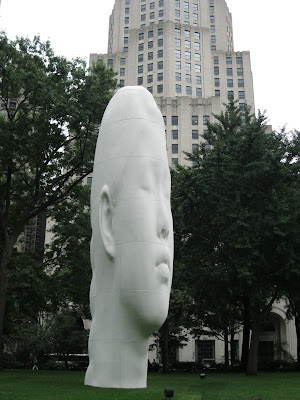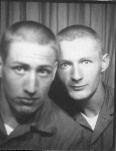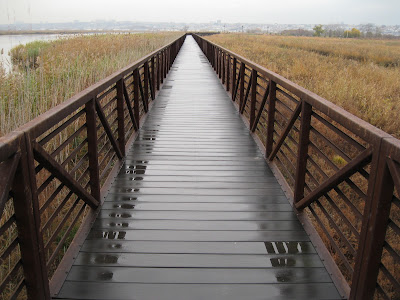Chapter 14: The stern man's last stop
Our departure from the terminal in Lexington, stirred up the
passengers again – we finally stepping over the threshold into “The West”,
although in truth that distinction went to St. Louis later when we crossed the
mighty Mississippi.
We traveled in growing predawn light, although lights also
came on above many of the seats. We could see the growing green of the hills
around us, and staples of horses, reminding me of some of the tales Laura had
told me earlier about her brothers’ love of cars and horses – and country
music. Trucks crowded the highway around us, coming from or going to the west.
Signs posted for cars gong the other way boasted of places like Fork Knox,
Radcliff, Elizabethtown and other places the night had denied us. I even saw a
sign for a place named “Horse Cave,” and tried to envision it.
Sounds stirred from many seats whose lights remained
un-illuminated. The two young lovers had constructed a blanket tent above their
two seats out of which a string of giggles came, from time to time, one or both
of their heads would pop out the top to peer around, like children checking on
the adults to see if anyone suspected what the two might be doing.
The professor, as Mrs. Warton and I called him, with his
nearly constantly burning pipe, puffed madly as he unfolded some new edition of
the New York Times that head managed to purchase in Cincinnati, now days old
with stale news, yet no less dignified for the fact.
The older man behind me woke with his usual series of
hacking coughs, something -- until then -- I had not associated with the pipe
smoke flowing from across the aisle in his direction. Yet if the smoke annoyed
this man, he made no protest, just hacked and hacked and hacked until I thought
he would expire.
But even in the growing light, one part of the bus remained
dark, like a black hole refusing to accept any illumination except by choice,
containing the mysterious, grey-eyed man, who – when I chanced a glance in his
direction – seemed to remain asleep.
He slept as sternly as he stared, carved stone for a face,
who turned like a tank turret in his seat, making my study of him brief, for
fear he might wake up in the midst of it, and start staring at me again.
Our route zig-zagged across the south, bending south into
Tennessee, taking in Nashville and Memphis rather than straight across to St.
Louis. We rolled over the lower peaks of blue mountains, and those we couldn’t
climb, we plunged through – tunnel after tunnel – until Nashville and the
flatlands, and again I thought I heard the pluck of guitar pickers, the hostess
adding to this by a brief history and geography lesson on the town.
“It is also located on the Cumberland Plateau,” she said.
“We’ll be riding this for a while, so you won’t have to worry about your ears
popping.”
Even as daylight came and the rest of the bus grew restless
for St. Louis, the next important stop on our journey west, the stern man
slept. It wasn't until the hostess made her way down the long aisle asking our
preference for breakfast that the truth was discovered.
"Sir," she
said. "Would you please tell me which kind of cereal you prefer? Sir?
Sir?"
Each of the woman's
words grew more panicked and caused her to shake him harder as if she could not
yet believe what had transpired. But when he slumped down into the vacant seat
beside him, no doubt was left, and she leaped back as if stung by a dozen bees,
the man's head striking the arm rest with the thud of clay.
"GEORGE!"
the hostess yelled.
The driver glanced up
into the large rear-view mirror and frowned.
"What is
it?"
"You'd better
come back here."
Even without putting
a name on what we all now knew as true, the air stank of it, the way my old
house had stunk that day I climbed up the front porch from school to find one
of my uncles waiting to escort me, his arm around my shoulder as he informed me
about my grandfather's passing, such a subtle, yet powerful scent that it
stirred up some fear so primitive in me -- and perhaps the others -- that I
could not move or make a sound, even as the bus pulled over the side of the
highway, even as the driver rushed down the aisle to join the hostess at the
man's seat.
"What is
it?" the driver asked again.
"You'd better
look over this man," she said, in a voice so weak I head to lean into the
aisle to hear it.
The driver leaned
over the slumped man in the seat. The rest of the passengers all had their
heads poked into the aisle now, or up above the tops of the seats for their
glimpse, shifting and twisting in an attempt to get a better view.
The driver stood up
sharply and hurried to the front of the bus, fiddling with something under the
dashboard -- the static of which said it was a two-way radio. Then, we all
waited, but not along. Outside, we heard the siren rise in the distance,
something nearly imperceptible at first, then growing louder and more
insistent, more definitely coming to us.
Now, I slumped down
in my seat, the whole horror of having the police see me crashing in on me,
making me wish I had the same excuse as the lovers had to cover my head with a
blanket.
What if the cop
recognized me from some newly issued wanted poster? What if we all got dragged
off the bus and questioned, and I could produce no proof of who I claimed to
be?
I saw myself in
handcuffs being escorted back to New Jersey, as humiliated this time as I had
been that first time I tried to run away and got caught walking through Little
Falls with no more excuse then as to say I had a half day off from school, and
the cop then checking his watch to notice that it wasn't yet noon.
Then, the driver
reappeared followed quickly the police officer, both passing me in a thud of
boots, neither taking notice of me or any of the other more curious passengers.
The cop stopped, bent over the slumped man, rising a moment later with a long
sigh.
"Is he
dead?" the hostess asked.
"Afraid so,
Ma'am," the cop said. "I'd better call an ambulance."
"Damn," the
driver mumbled and hurried back to the front, where he fell into his own seat
behind the wheel, looking as frustrated as a puppet whose strings had been cut,
staring at nothing, not even the clip board schedule that hung from the
dashboard near his knee.
No siren accompanied
the ambulance, though its lights flashed as it pulled up, clearly already
serving the purpose of hearse. Men in white clamored in, dragging a folding
stretcher with them, behind them, two grey-suited men, one wearing round
specks, both men leaning in towards the slumped stern man in the seat, each
repeating the same act, listing to the chest with a stethoscope, each feeling
the stern man's wrist, each standing up again, shaking his head.
"Been dead for hours," the man with the specks
said, drawing a nod of assent from the other.
"Heart attack or
some other such thing," the second man said. "Won't know for sure
until we cut him open."
"But that
shouldn't stop the bus from going on," the man with the specks said.
"It's natural causes, we're sure."
And just like that, the stern man, whose destination was
Cincinnati, who has changed his mind, finally and permanently left the bus,
each of us watching his covered remains carted out by the EMTs, the lead one
stumbling as turned the sharp angle steps to the street. We watched out the
window as the they loaded the stretcher into the ambulance and then drove off, followed
by a black, government car with the two grey men.
The cop asked
everyone to step out of the bus, and it was a dreadful moment for me, as I
became more and more convinced that I would now go to jail.
One by one, the other passengers filed by their faces nearly
as grey as the stern man's had been, the lovers, no longer giggling, the
professor's pipe, no longer lit. Even the coughing man seemed to have found a
temporary cure to his hacking. I rose last and took longest to make my exit,
easing down on the cold highway side, only then realizing that dawn had fully
risen around us, and that we could now look squarely on each other's faces.
No one looked happy.
Another police car
had come with a man in a brown suit who bore a clipboard of his own. The driver
was bent beside the bus, slowly dragging out baggage from the storage
compartment.
"I'm afraid
we're going to be changing buses," the hostess told us, her trembling
voice lost without the bus's public address system to aid her. "We're
waiting on the new bus to come out from St. Louis. It won't be a long wait.
Meanwhile, the police need to get some information from you, your name, your
destination, and an address where you can be located if they have any
additional questions later."
A moan went through
the passengers, yet none nearly as loud as the one inside my head, as I watched
the brown suited detective work his way down the line of passengers until he
got to me.
"What's your
name, son?" he asked me.
I shuddered out the
reply I had given Mrs. Warton and later, Laura.
"Take it easy,
son," the cop said, placing his free hand on my shoulder. "Death is
no easy thing for anyone. But, at least, you get to go on. That poor fool
won't. The grave's the last place he expected to get to when he bought his ticket."
I nodded. The cop
moved on. The cold wind swept in around me. I was still inappropriately dressed
for the weather, that scent lingering in my clothing permanently.




Comments
Post a Comment